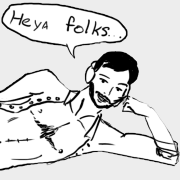|
All arrangements and contracts should be hilariously one sided. Every employee should be expert negotiators as well as be a master of their craft. Don't share salaries with each other because that information is only something management should know. Less pay for girls because there's no way they're as good the boys. That's been basically the motto for the last few decades. Maybe it's time to change? I just wanna create cool poo poo my dudes not work my rear end off so some troll can have another yacht as everyone gets laid off for the 3rd time.
|
|
|
|

|
| # ? Apr 19, 2024 04:27 |
|
Buckwheat Sings posted:All arrangements and contracts should be hilariously one sided. Every employee should be expert negotiators as well as be a master of their craft. Don't share salaries with each other because that information is only something management should know. Less pay for girls because there's no way they're as good the boys. All of this is wrong. Fortunately, you are the only person I have heard that holds this opinion.
|
|
|
|
Potato Salad posted:Larger unions represent management, engineers, support, etc in different pools. This is to ensure there is a lack of conflict of interest when, as an example, an engineer has a problem with a manager and both are members of the union. That doesn't answer my practical questions though (Though it may help explain the narrow focus?). From conception to development to launch to post launch support to everyone getting paid correctly there's literally hundreds of people involved at major publishers in gaming. The union push is unclear as to how it's going to address the disparity of those roles, or if it even wants to. I'm also not quite sure of the machinery of deploying a union in that environment. Do you narrow down the company to one segment at a time and hold votes in that segment and slowly roll it out?
|
|
|
|
In the Danish model (there is no minimum wage set by law in Denmark, it's entirely controlled by unions' collective agreements) you will find a multitude of unions covering the different trades within one company. Occasionally this even depends on education, e.g. in the IT department where I work, some of my colleages with the same job description and title as me are employed under a different agreement, only due to having a different path in education. There would not nothing strange about software developers, graphical designers, content writers, management, janitorial staff, etc. all being under different agreements bargained by different unions.
|
|
|
|
|
nielsm posted:In the Danish model (there is no minimum wage set by law in Denmark, it's entirely controlled by unions' collective agreements) you will find a multitude of unions covering the different trades within one company. Occasionally this even depends on education, e.g. in the IT department where I work, some of my colleages with the same job description and title as me are employed under a different agreement, only due to having a different path in education. Pretty much the same in Norway. I don't understand why people in the US find the workings of unions so hard to get (in general, not just game dev). They're common in Europe and for all of their shortcomings, they mostly work? They're certainly better than what is in the US now, which is basically "you have no rights and we'll work you to depression or death at our discretion".
|
|
|
|
Right, but details guys. Picture this: saying you need practical deets on union function and goals, but also pointedly finding such information yourself  It's like the concern trolling through the 50s and 60s about what the details of ending segregation would look like. To paraphrase, "We already have a forum, why add the bureaucratic complexity of a voting rights bill? What about the practical questions?" as if the practical limits of individual power or the capacity for the status quo to deprive individuals of their rights was not plainly obvious to them. Potato Salad fucked around with this message at 10:45 on Apr 8, 2019 |
|
|
|
Star Warrior X posted:In that case, is there no middle ground purpose for a union or guild? Nothing it can do that requires less collective power than the full ability to strike against a studio, to back up its collective negotiating stances? Does this truly need to be a one-step process, from nothing to full-blown every-studio-vs-a-union-rep contract negotiation all at once? Yes. There are 'middle ground purposes' but those middle ground purposes are not unions. They are stuff like lobby groups, activist groups, and yes legal fee gofundmes. If employment law already allows most issues to be addressed through lawsuits, if a self sustaining lawsuit process is plausible whereby settlements can fund additional lawsuits, then there wouldn't be the need for unions that people see. The core purpose of union is the bargaining power to negotiate employment contracts and hold management to their terms (probably not drawing up new contracts, but at least resisting changes to contracts, or establishing minimum terms). Stuff like legal aid and pressuring lawmakers to change the laws are secondary things an union might also offer but they require a large organisation with lots of members to already exist.
|
|
|
|
AG3 posted:Pretty much the same in Norway. They've been extensively demonized for years and years and years and years with a side factor of actually being corrupt in some instances
|
|
|
|
Fangz posted:Yes. There are 'middle ground purposes' but those middle ground purposes are not unions. They are stuff like lobby groups, activist groups, and yes legal fee gofundmes. If employment law already allows most issues to be addressed through lawsuits, if a self sustaining lawsuit process is plausible whereby settlements can fund additional lawsuits, then there wouldn't be the need for unions that people see. The core purpose of union is the bargaining power to negotiate employment contracts and hold management to their terms (probably not drawing up new contracts, but at least resisting changes to contracts, or establishing minimum terms). Stuff like legal aid and pressuring lawmakers to change the laws are secondary things an union might also offer but they require a large organisation with lots of members to already exist. I thought one of those other things might be considered the larval stage of a full-blown union. A smaller, easier to build step on that road. The leadership team of a union dedicated to collective negotiation requires the following skills: 1. Expertise in negotiating large-scale labor contracts (and ideally a proven track record). 2. A thorough understanding of the game industry (and ideally personal experience making games). 3. Public relations skills, to ensure that consumers don't blame the union for bad games, game delays, etc. 4. Investment/Money management ability, to judiciously and wisely handle their war chest. To my knowledge, nobody with that skillset has so far volunteered to lead us. I'm not sure such a person or team exists. Even if such a person or people does come forward, it will still be a pretty big leap of faith to trust them with enough money and power to negotiate for us. I hoped one of those middle-ground purposes could be used to find and vet potential union leadership. Without that, I guess all I can say is that I'm glad I'm indie, and therefore won't have to be among the first to choose whether to take a chance on whoever ends up stepping forward as union leaders.
|
|
|
|
It's not related at all. The core skillset of union leadership is to be a facilitator and help organise union meetings. Their job is not to come up with the union's position. It's not a big deal, we can find committee members easily in our 40 person organisation. If the membership aren't confident in their PR/negotiation capabilities just go for more modest proposals. If specific skills are needed, hire outside people or get in consultants from other unions/professional bodies. The biggest issue we've ever had is finding someone to take notes at general meetings. Fangz fucked around with this message at 14:34 on Apr 8, 2019 |
|
|
|
Chewbot posted:You know what? gently caress it, I wasted two hours writing a reply and deleted it. I don't need any of this coming back to bite me in the rear end, and it always does. i found a plan for you. https://calaborfed.org/union-organizing/how_to_form_a_union_where_you_work/ union dues also do not take a large portion of your paycheck, that is a lie managers tell you to stop you from forming a union.
|
|
|
|
You lose an even bigger portion of your paycheck during salary negotiations.
|
|
|
|
Star Warrior X posted:All of this is wrong. Fortunately, you are the only person I have heard that holds this opinion. I think you're missing the point, or taking a pretty uncharitable reading of what they're saying. Just choosing one point, women are systematically paid less than men in the games industry, as well as society as large: https://www.gamesindustry.biz/articles/2019-04-08-gender-pay-gap-widens-in-uk-games-industry . Beyond that, in the UK it's worse than industries in general: https://www.gamesindustry.biz/articles/2018-04-04-gender-pay-gaps-revealed-across-leading-uk-games-firms. There's been evidence of a similar gender pay gap as long as the Gamasutra developer salary surveys have been a thing, at least, in the US as well -- and, obviously, in the US at large since forever. The fact that you've 'never heard of anyone holding that opinion' doesn't really matter given that there's material evidence that 1) some people do, in do many words, hold that opinion, 2) people have implicit and unspoken biases that are often much more damaging than explicitly held opinions (see 'new prejudice' or any article on implicit bias), 3) there are structural issues that are making this happen that need structural solutions, such as those a union could provide, or at least lay the groundwork for, and 4) regardless of the source of the pay gap its clearly present. There are also a lot of ostensibly 'gender-neutral' programs, such as having family leave rather than just maternity leave, having better flexible work policies, etc. etc. that have a massively uneven effect on women given how society/child-rearing are structured that 1) are the kind of workers-rights things that a union can and should advocate for and 2) actively perpetrate a gender pay gap regardless of whether individuals think 'boys are better than girls'. Intent matters, sure, but it is far, far from all that matters. Just in general, conflating 'I haven't seen people advocating for this belief' and 'this belief doesn't exist' is pretty flawed' -- not just because of the difference between explicit and implicit biases, or the difference between stated opinions and what happens, individuals v structures, etc., but also because universalizing your experience is a big part of the whole issue! Maybe people treat you differently than others, tell you different things, etc. etc. This same logic applies to all the other points: even if you aren't hearing people explicitly state those opinions, it doesn't mean that they aren't held, or that they aren't the dominant structure for the industry. foutre fucked around with this message at 07:58 on Apr 9, 2019 |
|
|
|
GaemzDONOTHINGBUTPAINSUFFERAGEFORNINJASORPIRATE I oval office remember which gently caress to give! (USER WAS PUT ON PROBATION FOR THIS POST)
|
|
|
|
foutre posted:I think you're missing the point, or taking a pretty uncharitable reading of what they're saying. I shouldn't have responded to hyperbole with hyperbole. What I was trying to say there is that when I argue that a nascent union should have a platform for reforms and solutions in addition to a list of grievances, it is unfair to me to claim that I am also arguing in favor of injustice.
|
|
|
|
Star Warrior X posted:In that case, is there no middle ground purpose for a union or guild? Nothing it can do that requires less collective power than the full ability to strike against a studio, to back up its collective negotiating stances? Does this truly need to be a one-step process, from nothing to full-blown every-studio-vs-a-union-rep contract negotiation all at once? 0: Employee is unhappy with something. It could be "the new printer was installed right next to my desk and it's too loud," it could be "I am being asked to do something that goes against my contract," or it could be "I am being asked to do something that does not explicitly go against my contract but I feel is unsafe/illegal." 1: Employee documents the issue and brings it up their boss within a reasonable time frame. They try to solve the problem informally. If it can be solved informally, great. (Sometimes optional, sometimes required, sometimes not a step, depending on contract/law.) 2: Employee and a union representative meet with the supervisor (and possibly others) to try to solve the issue and determine whether it is actually a proper grievance or not. The grievance is compared to past precedent, and people try to hash out a formal or informal resolution. (Whether an issue is a formal grievance or just a complaint will depend on your contract, but any safety issue, legal issue, or contractual issue would generally be covered.) 3: Possibly some internal appeals process. 4: Arbitration. Expensive and time-consuming. The overall goal is to resolve things before this point. There is generally a timeline for each step of the process, including the first report. Having a union rep involved helps ensure that not every employee need be an expert on the finest details of the contract and previous precedent, and it lets the union be the "bad guy" in place of the employee. It's not a one-sided thing, either. Reporting time limits, documentation, and forced arbitration also serve to protect the company, especially from boneheaded middle-management decisions. Also benefiting the company, the union has its reputation to look out for in the grievance procedure; they want management to pay attention when a grievance is filed. As a result, they will generally tell their employees, "Nope, you're in the wrong on this one. Management is completely allowed to limit you to two pads of post-its a day. We can go with you to try to work something out with the boss, but if she says no, we can't and won't do anything about it." If the issue is a particularly big one, it'll come up again at the next contract negotiation. hey girl you up fucked around with this message at 16:17 on Apr 9, 2019 |
|
|
|
I'll give the union debate credit, it is equally as spiky on a forum as it is in real life. Some of the people talking about it at GDC this year were.... enthusiastic. It's also interesting to see peoples reactions when the controversial position of "I don't object to a union in principal, but I don't see the benefits given current evidence" is stated. Given the personality types rolling around the industry that stance is likely not to be uncommon, and there may need to be a cogent response to it.
|
|
|
|
Star Warrior X posted:I shouldn't have responded to hyperbole with hyperbole. What I was trying to say there is that when I argue that a nascent union should have a platform for reforms and solutions in addition to a list of grievances, it is unfair to me to claim that I am also arguing in favor of injustice. Yeah, to be fair I think I kind of missed your hyperbole too -- I've run into enough people that actually think that, so I committed to it. What you're saying is definitely a different thing, my bad!
|
|
|
|
I decided to click on this thread because I was curious what kinda chatter was going on, saw unions were being discussed, thought I'd go to the origin of the discussion to see if I needed to add my two cents when suddenly...Star Warrior X posted:Personally, I do not feel that a union, at least, the groups currently attempting to organize a union, represent a good solution to the problems of job insecurity, pay inequality, and crunch. To me, the current unionization efforts sound a lot like the underpants gnomes, presenting themselves (i.e. unionization) as the solution to these problems without laying out any sort of strategy for actually solving anything beyond declaring the union to exist. If you take a look at the most prominent pro-union group's website (https://www.gameworkersunite.org/) you will find a well thought out and detailed list of grievances, but not much in the way of solutions or concrete, workable proposals for solutions.
|
|
|
|
DaveKap posted:I decided to click on this thread because I was curious what kinda chatter was going on, saw unions were being discussed, thought I'd go to the origin of the discussion to see if I needed to add my two cents when suddenly... You should read some of the other posts that address this. I recommend this one: Fangz posted:Look, you don't have to take part in the decision making process. You don't have to be a founding member of any union, you can wait until other folks discuss things and come up with motions before signing on.
|
|
|
|
RossCo posted:It's also interesting to see peoples reactions when the controversial position of "I don't object to a union in principal, but I don't see the benefits given current evidence" is stated. That isn't to say that the problems aren't real, but if the pitch is "join a union because you're being abused" then it's going to run into a lot of people that think "well I don't feel abused, and it's not like I'm trapped in this job anyway." The more relevant thing really is that it's simply leaving a lot of money and benefits on the table by not doing it.
|
|
|
|
General question about sports video games: Why do they so rarely improve and tend to break poo poo that was fine, add poo poo no one needed and take out stuff people liked? Is it because they know that once a year, regardless of how bad the game is, people will line up to buy it anyway, bitch about and then do ti again next year? These games are always rife with money plays, glitches and AI cheating. Are they just that hard to develop? Is the one year window just not enough time to rebuild broken stuff?
|
|
|
|
OneEightHundred posted:You're going to see a lot of "don't see the benefits" because framing it as primarily a remedy for abusive working conditions is a mistake. They're white-collar desk jobs with decent pay and benefits. Despite the headlines, working conditions and job security have been steadily improving, mostly because of consolidation and risk dilution. Talking about how much studio heads make has to contend with widespread profit sharing and bonus plans. A LOT of the workers accept the long hours as worth it for the fat bonus or to work on something awesome. Many of them could quit and easily get a job that pays more with fewer hours at a non-game company. To be fair, I don't know your specific role, but your first two paragraphs sound very much to be from the point of view of an engineer. From a designer or artists point of view, there is very little related work available in other industries and certainly not at higher pay. As a result engineers of course are paid much better than designers or artists  Of course, I do think you're correct that the unionization pitch needs to be inclusive of engineers and pitch the benefits to them too, but it's also the case that they have it the best of any game-related disciplines and it's not entirely fair to evaluate the state of employment for the industry as a whole based on their quality of life. For what it's worth, having worked for 15 years or so in games, I received profit sharing or a bonus for a little over half of those years but I don't know that it's truly widespread across the industry as a whole. And, "profit sharing" makes it sound more generous than it was, really it was "optional bonus that may or may not be tied to company and personal performance". I was lucky to get some nice bonuses but not everyone had the same experiences.
|
|
|
|
I have some union experience over in feature animation in Los Angeles with IATSE/TAG. It was fine, the practical benefits was: -Good Pension Contributions [used to be a double pension but that got phased out a few years ago in favor of funding/maintaining health care benefits after ACA changes]. -Portable health care benefits. Health care was through the Union not your employer, get laid off or have a round of contract gigs? Work for a non union company for a bit? No problem you are still covered provided you work your union minimum hours within a certain time frame [ xxx hours a year/2 years]. -Permanent health care coverage once you reach the yearly threshold, used to be 10 years I believe its now 12. Once you hit 12 years of union employment, you get full health coverage until retirement. No hour minimums or anything. You can quit/change careers/start a business/etc and you'll have full health care until you hit retirement. -Wage minimums, for the digital/cg guys, it was around $65,000-70,000 starting salary right out school. Downside to that is you are locked into that rate with no increases for 3 years. -Related to above, guaranteed minimum cost of living pay increases and minimum pay raises. -Enforcement of Overtime/Doubletime and appropriate OT Meals [eg. a no pizza and cold sandwiches clause, like other Hollywood unions if you are working late you got $20 a night for food allowance or catered hot food with no fast food/pizza/sandwiches permitted]. Union reps occasionally check to see if people are working off the clock who shouldn't. -Making sure job descriptions/roles weren't getting too weird. The big change in that space over the past few years in animation was the proliferation of cintiqs and working storyboards all digital. A few folks who were really good at this started doing extra work such as animated boards and animatics were being done for "free". In the past boards were boards and editors compiled them together. All of a sudden you had a few story people who were doing 3 jobs at once and some studios started to gain the expectation that is the new norm. The union had to step in and really define things out which took a few years, but they created a new role/job for that position and off loaded work from other roles. That being said here's what the union won't help with: -Related to the last point, they don't really interfere with internal job/title/role assignment unless a new industry dynamic opens up and you get multiple studios and union members bumping into issues on job definitions. The big thing in hollywood was that originally "internet shows/streaming" was treated completely separate from film/tv. The union stepped in and ended up working out deals for that. But if there's a fear that your game dev job is going to get screwed up because now you have to worry about seniority and poo poo like that, I never saw that happen with creative industry unions, I know there's horror story's in other union sectors but I never saw it with IATSE. -Mass layoffs / Project mismanagement. Big corps will gently caress up financials and have to drop 400 people all of a sudden, the unions can't stop that, but they'll help you get work and hey, you'll still have union health care. -Project mismanagement 2 / Compensation. Unions won't interfere with wage maximums, only minimums. If you got 2 dudes doing a similar job but one is making 90k and the other is making 140k given similar backgrounds, that's on the individuals generally. They're not also going to care if the CEO and execs get a crazy bonus and a $1200/month car allowance on the company dime. They will step in and question legality of things, for example if there is a wave of layoffs and shortly afterwards the company decides to give whoevers left a nice performance bonus, they'll go in for the recently laid off and ask "hey, shouldn't these former guys get at a minimum a prorated bonus?". This happened during Frozens bonus fiasco a few years back. I've been out of the union for a number of years now, I wish I was one of the dudes who worked all their career or.. at least 10-12 years of my career at a union shop, that "forever" health benefit would have been nice. That being said the games jobs I never felt the need to unionize, I generally work 8-9 hour days, get free food, good bonus money, and good benefits so I count my blessings on that front so far... Big K of Justice fucked around with this message at 02:26 on Apr 15, 2019 |
|
|
|
Yeah all of that sounds like a dream. I have a defacto mobile health care benefit insofar as we get our insurance through my wife's employer which is extremely stable. It makes a HUGE difference, especially with kids. I've been laid off twice, worked a year of freelance, and was just generally able to make more decisions for better reasons since our health care is decoupled from my employment.
|
|
|
|
Yeah a standardized health care system across studios would be the largest benefit. Hard to explain to new folks to the industry but once you get into the 30s and 40s its like.. oh poo poo.. a huge factor. I've known people who were key in their positions who jumped ship from their AAA project because of lovely health care coverage for them or their family. And kids. Man, I was at [big game company with a weirdo almost non-existent HR dept] for a while and just in my department things were weird. We had staff and contractors who had kids, one guy had a kid and was only out like $150 deductible, then you had another dude who had to hit his yearly max contribution of $8000 to have his kid. We were trying to figure things out but it turns out different employees had different benefit pools on almost a seemingly random basis. Employees were consistent but contractors were completely all over the place, some had killer benefits like the employees, others didn't. Even in the same department. That was pretty bizarre. Union would theoretically normalize that and hey if you are a union contractor great.. you're on their policy instead.
|
|
|
|
Game question about game dev for a change of subject: Why in recent times do devs still attach mechanics to the frame time instead of to an independent clock like the one the system comes with? I can understand doing it in the past where you want to squeeze every bit of memory out of the system but there's been lots to spare for a while now. So you still have games that can behave drastically differently if the frame rate dips or rises.
|
|
|
|
|
Flannelette posted:Game question about game dev for a change of subject: One really good reason to do this is in fighting games, where a huge amount of information is carried by the animations. When things like invincible frames, blocking frames, precise hitboxes, and so on are all tied to the animation frame, it makes sense to time various moves by frame as well.
|
|
|
|
Flannelette posted:Game question about game dev for a change of subject: Do you have a more specific example of a game you feel behaves this way? The question is a little confusing to me, because "frame time" can mean different things and memory has nothing to do with it. It's also worth mentioning that FPS dips can cause wonky behavior no matter how your timing works.
|
|
|
Star Warrior X posted:One really good reason to do this is in fighting games, where a huge amount of information is carried by the animations. When things like invincible frames, blocking frames, precise hitboxes, and so on are all tied to the animation frame, it makes sense to time various moves by frame as well. That's a good reason, keeping everything tied together so it's not suddenly dealing with constantly changing timing. Hyper Crab Tank posted:Do you have a more specific example of a game you feel behaves this way? The question is a little confusing to me, because "frame time" can mean different things and memory has nothing to do with it. It's also worth mentioning that FPS dips can cause wonky behavior no matter how your timing works. Usually it's things like every x frame(s) check/do "something" then if you double/half your framerate it will now check it twice or half as often and for things that run over a certain period of real time they suddenly happen twice/half as much. I can't think of any proper examples but mainly it means you can often run/jump further if you increase the framerate and collision checks happen more/less frequently which usually does nothing but sometimes breaks the game, googling it brings up fallout76 having its physics break at higher framerates (seems like physics is the most common victim of it with lots of changes over time) . It seems like it's just easier to do it this way because you don't have to worry about interpolating and synchronizing 2 timelines (one for constant paced things and one for the changing framerate) and having one wait for the other but it just goes wrong sometimes and they just hope it's not game breaking.
|
|
|
|
|
Well, there's a couple of things going on there. One of which is what I alluded to earlier: most engines that support variable timesteps may still have problems with things like physics. There's no excuse for writing your code so badly as to not care about how long the timestep actually is. But even if you do, doing physics simulation twice as often is still going to affect how your physics works. Now, generally, the more physics ticks you do the better your simulation is likely to be, so this isn't really a problem. Dips are far more damaging in that regard - that's how you get stuff clipping into walls and whatnot. Because no matter how your timesteps work, physics engines are approximations at best and are generally built with assumptions about the limits of the kind of things will usually happen in the game, and tend to go wonky when those limits are violated. There is some value to always running fixed timesteps, though, assuming again that you didn't write your code so badly that you ignore what the actual timestep is. In particular, it's generally thought that a consistent 30 fps is better than an inconsistent 45, say. This isn't strictly what you're asking, but it is kind of in the same area of... timing stuff. But in general, poo poo like that Fallout 76 things is just bad, lazy code. There's no excuse. I don't even think there are any valuable performance gains to be had.
|
|
|
|
I do recall stories about how in the RE2 remake, the knife does more damage the higher the framerate is.
|
|
|
|
ZiegeDame posted:I do recall stories about how in the RE2 remake, the knife does more damage the higher the framerate is. Dark Souls 2 PC had an issue where weapons hitting corpses would lose more durability at higher framerates. There's a bunch of bugs like this
|
|
|
|
Flannelette posted:Game question about game dev for a change of subject: Other people have hit on this, but the fundamental problem here is not that mechanics are tied to the frame time, but that they *aren't* tied to the frame time. They are simply doing a fixed calculation each frame and ignoring the time it took to produce the frame. In many older games, the simulation always advanced forward a fixed amount each frame. The end result of not being able to produce frames quickly enough in this model is slowdown, like you'd see in old NES games when too many sprites got on screen. Everything appears to run in slow motion because the simulation is moving forward at the same rate per frame, but the number of frames per real world second has gone down. In newer games, and in situations where frame rates can be more variable, games instead try to match the simulation rate to the frame time. This is also a requirement for online games for reasons that are hopefully obvious (you can't have two clients simulating at different rates in real time). The simulation needs to be set up to accept time as a parameter, and each frame it does X ms worth of simiulation, where X is the amount of time since the last frame. However, there's a couple problems with this - first, when you make a simulation continuous instead of discrete, you have to deal with what happens "in-between" simulation steps. This is a common problem in physics and collision systems, where objects moving too quickly can interpenetrate or tunnel through barriers. These problems can be solvable but require pretty thorough testing. There are also knock-on problems with things like physics, where doing a continuous check on one object can cause changes in another object that should technically be resolved this frame, but you can't follow that chain of interactions forever given that you have limited frame time. Basically, in short, making simulations discrete is way, way simpler, more intuitive, and efficient (from a computational perspective). Making systems continuous is more challenging. If you know your game isn't ever going to run above 30fps, you could be forgiven for not finding those bugs - and, when you don't devote as much testing to the PC release as you do to testing the whole game, it's easy to see how a subtle bug like the Dark Souls durability thing could be missed. In the Fallout 76 case, a lot of this sounds like systems that are still built as discrete in some respect (each frame does a fixed amount of something) versus fully continuous and accepting time as a parameter. I'm not actually sure in the Dark Souls case - I don't know that it's easy to find out, but does hitting something at very low FPS deduct way less durability? If so, it's probably the same issue. If not, there's probably something else going on there that may be a more subtle bug.
|
|
|
|
Yeah, fixed timestep's not just more efficient, it's much, much more stable in the mathematical sense, and that's true even for continuous simulations. The size of the time step doesn't matter much (because you'll be able to tailor your epsilons (fancy math term for error margins) for it), what matters is that it stays constant. Note that there is a trick which is to have a fixed timestep update loop and a variable timestep render loop that basically interpolates between the last two fixed timesteps. That gives you both numerical stability and variable timestep rendering at the mere price of roughly one extra frame of input lag. As for the "why", both UE and Unity are historically variable timestep engines, their default behaviors are to match the simulation to the frame rate which is why most games do it and thus variable frame rates induce bugs (I still remember the solution to a jumping puzzle I couldn't clear in NaissanceE was very officially to lower my resolution so I'd have a different frame rate with different physics). Fixed update rate options have since been implemented in both but aren't the default. This was greatly motivated by the fact physics engines largely prefer fixed update rates for the mathematical stability reasons already mentioned, and many networking models necessitate it as do certain genres like fighting games. But the rabbit hole goes deeper: as long as it has no bearing on the gameplay it may actually be desirable to leave some relatively expensive simulations out of the update loop and sync them to the render loop instead, like physics for fancy particle effects, while some GPU effects that would've been thought to be part of the render loop still have to be synced with the update loop instead if they influence the sim (like fancy water heightfields). So it's a tricky domain and many devs aren't even aware of the math implications of variable timestep (and it'll suit their purposes just fine, too). Chev fucked around with this message at 19:05 on Apr 17, 2019 |
|
|
|
Found this when looking at other things about it https://www.youtube.com/watch?v=he02vJvKaRs Just an interesting thing I remember people doing but didn't know how it was actually doing it. djkillingspree posted:However, there's a couple problems with this - first, when you make a simulation continuous instead of discrete, you have to deal with what happens "in-between" simulation steps. This is a common problem in physics and collision systems, where objects moving too quickly can interpenetrate or tunnel through barriers. These problems can be solvable but require pretty thorough testing. There are also knock-on problems with things like physics, where doing a continuous check on one object can cause changes in another object that should technically be resolved this frame, but you can't follow that chain of interactions forever given that you have limited frame time. This is why most games that don't go into slowmotion (wait for the simulation and I think old games did it too since they had no buffer?) have backface areas on all the colliding parts that will shunt things back out onto the right side if a simulation step ends with objects penetrating?
|
|
|
|
|
Interpenetration is a problem you have to solve regardless of how big or small your timestep is. Simulated physics are by necessity discrete, since time is divided into chunks and not smoothly continuous (not to mention that our computers are fundamentally discrete). Consider a simple situation with two boxes, one static and the other moving towards the static one. There will at some point be one frame where the moving box is separated from the static box, and in the next frame it is intersecting the static box, assuming its motion were to simply continue. This is where the physics simulation has to decide what to do with the two objects in order to resolve the collision. The core issues are basically to determine 1) the point of collision, i.e. how the moving object needs to be offset to avoid interpenetration, and 2) the impulses to apply to the objects to simulate the transfer of kinetic energy involved in the collision (i.e. bouncing, knocking things over etc.). Leaving the second aside, there are a number of approaches to solving the first problem, of varying degrees of complexity and performance impact. Some systems try to figure out how far the objects have interpenetrated and simply pushes them apart. Others try to back up time and re-simulate the moving object with a smaller timestep to get a better estimate of where the collision occurred. If you want to be really accurate you have to do it for the entire scene, which is very complex and expensive. And some allow the objects to interpenetrate and try to apply forces over time hoping it will be enough to separate the two quickly enough. What solution is best for your engine is largely a matter of knowing what the limits are of what you're trying to simulate, and balancing that with the time and expense of finding a solution. If you know you never have to simulate irregular rotating objects and multiple rigid body collisions in the same vicinity, you can get away with a simpler solution and that's probably what you should do - simulating physics is hard at the best of times. Here's a lovely diagram I drew to explain a potential problem that could arise with unexpectedly high timesteps/velocities.  In the left scene, the object is moving slowly enough that the solver can correctly push the objects out of each other so they don't interpenetrate and all is good. In the second scene, the delta is too large, so the solver might get the idea that the best way to solve the collision is to move the object out the other side (being the shortest path and all). Worse yet, imagine what happens if the object is moving so fast that there isn't a collision at all in the timestep. This is the typical way objects tunnel through each other: the timestep or velocity get too large to correctly solve the collision, or even detect it at all. I'm sure you've seen examples of objects shooting away at high speed after interpenetrating, too. That's a result of trying to work out the correct impulses needed to separate objects, especially if you're using a spring-like model where interpenetration is temporarily allowed while you apply a force based on how much things are interpenetrating. An object has gotten stuck in the ground somehow far enough that the system thinks it needs an outrageous amount of force to separate them, and... the object, once dislodged, gets freaking launched. It can be especially dramatic if the system is built to accumulate force over time in this way if the object stays stuck for longer.
|
|
|
|
What kinds of ways are there for getting accurate looking high speed collisions that don't wreck the frame rate? For the production simulator type things I've used and some niche sim games the frame rate will drop readily below 1fps (often less than 1 frame a minute for a pure simulation) to make sure everything is done right. But for almost all games today they can handle lots of very high speed collisions through Havok or physx etc without losing playability and without the physics being noticeably weird. There must be some reliable tricks now that look right 99% of the time for all situations but don't bog down the game much. While before most games had things like you could break out the of the level geometry if you went fast enough and even things like the source engine and rage(bullet) engines built in physics don't mess up as much as the used to.
|
|
|
|
|
Flannelette posted:What kinds of ways are there for getting accurate looking high speed collisions that don't wreck the frame rate? Yes there are many ways to handle it. One most common is testing the path between the updates. So you record your position, then on next update/fixed update do a ray cast from your current position to your last saved position and see if it collided with anything. In that case you can determine you should have collided with that object. Unity has a built-in mode with https://docs.unity3d.com/ScriptReference/Rigidbody-collisionDetectionMode.html to test as if the collider was moving continuously but it's apparently very expensive. Example of "don't go through things" Unity script. http://wiki.unity3d.com/index.php?title=DontGoThroughThings It's old but should still work, a modern version could probably work off the main thread. Stick100 fucked around with this message at 13:56 on Apr 19, 2019 |
|
|
|

|
| # ? Apr 19, 2024 04:27 |
|
Stick100 posted:Yes there are many ways to handle it. One most common is testing the path between the updates. So you record your position, then on next update/fixed update do a ray cast from your current position to your last saved position and see if it collided with anything. In that case you can determine you should have collided with that object. i was thinking about that as a possible solution, but obviously it's fairly expensive. is "perform a raycast only if an object is moving at speeds faster than our normal physics accounts for" ever a solution? like if you know that things get wonky in your game if an object moves more than 1 foot in a single frame, perform a raycast to check collision if its moving more than 1 foot in a single step?
|
|
|











































